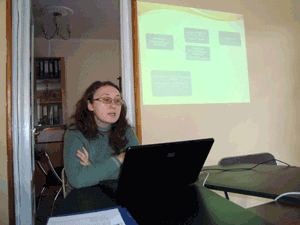Tea Tedliasvili, Gori
 The Georgian Government has not given official status yet to the IDP’s from the villages of Didi Liakhvi, Patara Liakhvi and Akhalgori. 8 months have passed since the war in August, but giving status to those refugees still is doubtful..
The Georgian Government has not given official status yet to the IDP’s from the villages of Didi Liakhvi, Patara Liakhvi and Akhalgori. 8 months have passed since the war in August, but giving status to those refugees still is doubtful..
The IDP’s all are IDP’s in their own country for the second time. They are the people who had to leave Tskhinvali and found shelter in the villages of Liakhvi Valley and on August 8, they were forced to leave those villages. The residents who became IDP’s only after the war in August, they still remain without any status of internally displaced people.
The representatives of the Youth Lawyer Association meet and carry out monitoring of the residents who suffered damage because of the war in August. The monitoring is of three categories of IDP’s in Shida Kartli. They are people who had to escape from the current occupied territories and from buffer zones. They have not received the status of IDP’s yet. These categories include also the people who received this status earlier when they become IDP’s for the first time.
According to Ketevan Bebiashvili, the head of the Gori branch of Youth Lawyer Association, the rights of the IDP’s from occupied territories are not respected, because they have not received the status of IDP’s yet, but the government was to give the status to the citizens in 10 days after receiving the notification.
Ketevan Bebiashvili said: “The government should have provided the status of the IDP’s not only for the residents of the occupied territories, but for us, the residents of Gori, as we had to leave the town for a certain time and they should have annulled that status as soon as we returned to our houses. According to the statement of the Ministry, this problem would be solved and the residents of the occupied territories would be provided the status of IDP’s and now they state that they will begin this process on May 1.” Lawyers of the Association say that the president’s order made on August 15 about providing the refugees with a provisional identity card has not been fulfilled yet.
According to the monitoring carried out by the lawyers of the association, it became clear that compensation of 15 000 USD paid for the houses that were burned was provided only for 415 families. The total amount of compensation provided by the government was 9.141,000 Gel. According to the annual account of the state budget in Shida Kartli, 6 millions of GEL was wasted as compensation.”I suppose this is not true”, said Ketevan Bebiashvili, the head of the branch of the Young Lawyer Association. “They exchanged the USD directly in the amount of the compensation provided and it has been expressed in the budget”.
If we change the USD currency into the national currency the amount of compensation will be
represented in the right way. But the highest department of Shida Kartli should consider that a sum of money in the budget should not be represented in foreign currency.
Legalizing the cottages and plots assigned to the IDP’s is another huge problem. The majority of the victimized people, who have received the cottages as a shelter, have taken loans from banks. The banks have written in the agreement documents that if the creditor does not pay the credit the bank will sequester or sell his/her property. Although so-called IDPs (they have not been granted with the status yet) do not have the cottages and plots registered to them the government is boasting about having started legalizing the cottages of victimized people. However, if the properties really are registered to so-called IDPs the banks will sequester or sell their cottages and plots to get the loan back. If it happens the victimized people will be in a very awkward situation.
Monitoring demonstrated that the government did not give school items to children from the buffer zone except those who went to the first form. It must be noted that allowances of 100 GEL were distributed to the children but unfortunately many children have not received it. The government does not take care of those people who did not want to live in cottages and received 10 000 USD as compensation. Special programs, like reimbursement for gas and electricity bills, are implemented for those living in cottages. However, this program does not cover the IDPs who have purchased flats.
Members of the Young Lawyers Association stated that allowances are distributed through violence. More precisely, there are no agreement documents designating the categories of people who should receive allowances. That causes chaos and misunderstanding and consequently many people are complaining. About 70 % of people from the buffer zone complain about allowances. Many people who cannot understand why they were not on the lists of international organizations that assist victimized people have applied to the Human Rights Center.. Village councilors were supposed to provide those organizations with those lists and then the international organizations should discuss those lists. However, the name of a person who was not inserted on the list by a councilor could not be assisted by the aid organizations. Local officials do not make the categories and criteria for selecting the beneficiaries.
One more problem is the absence of concrete programs for those people who were taken as hostages during the war. A similar program could provide former hostages with at least medical assistance. They particularly need the assistance of psychologists. Malkhaz Gochashvili, representative of the Ministry of Healthcare in Shida Kartli said that the government can apply to their office and they will definitely assist everybody.



